Why use Lambda expressions
Lambda is an anonymous function. We can understand lambda expression as a piece of code that can be passed (passing code like data). Use it to write more concise and flexible code. As a more compact code style, Java language expression ability has been improved.
Lambda expression
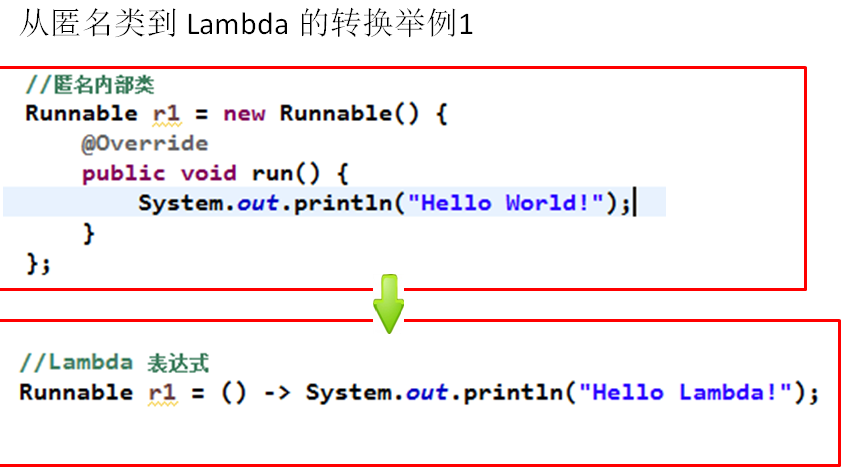
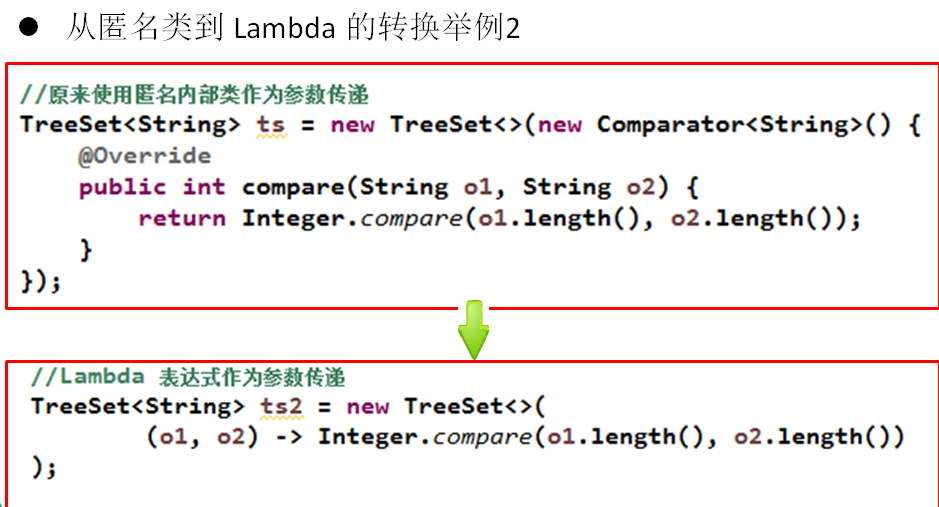
Lambda expression syntax
Lambda expression: a new syntax element and operator introduced in Java 8. This operator is "- >", which is called lambda operator or arrow operator. It divides lambda into two parts:
Left: Specifies the list of parameters required by the Lambda expression
Right: Specifies the body of the Lambda, which is the implementation logic of the abstract method, that is, the function to be performed by the Lambda expression.
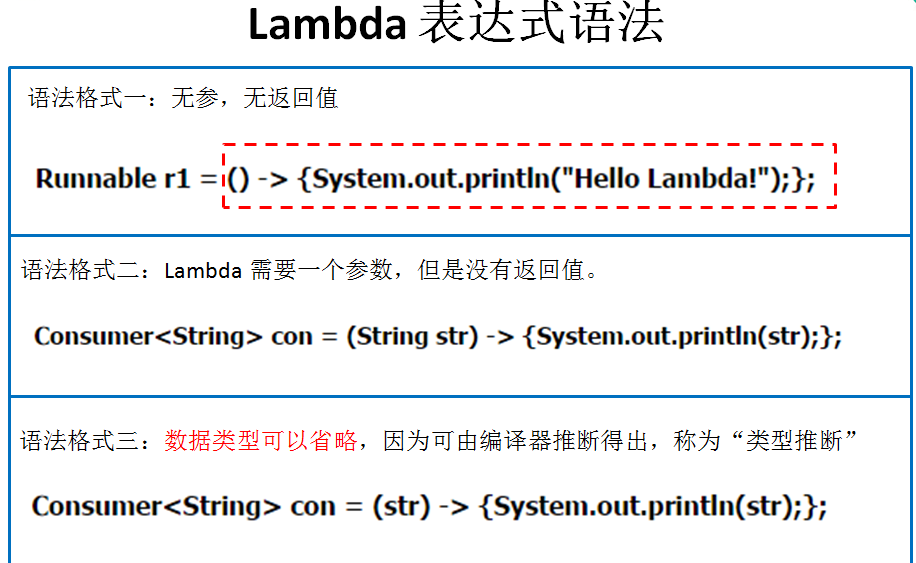
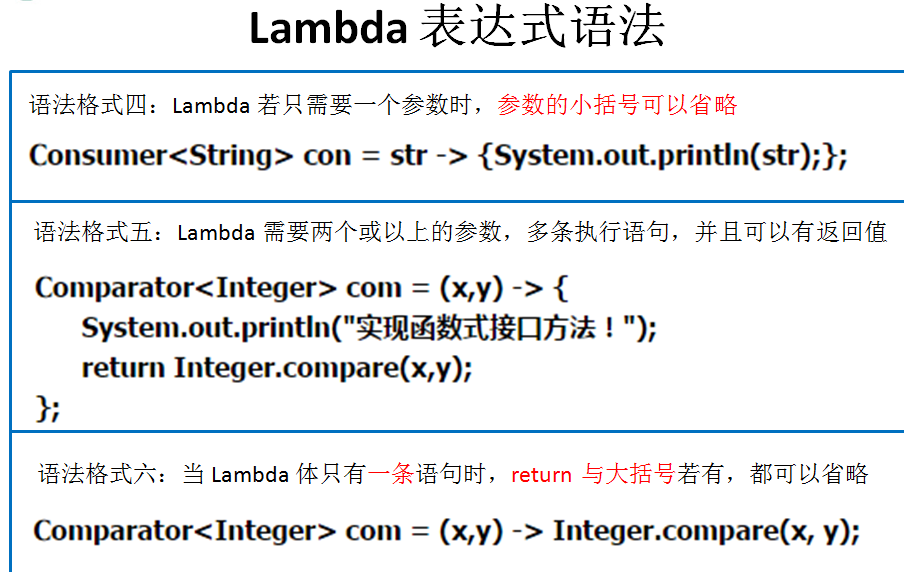
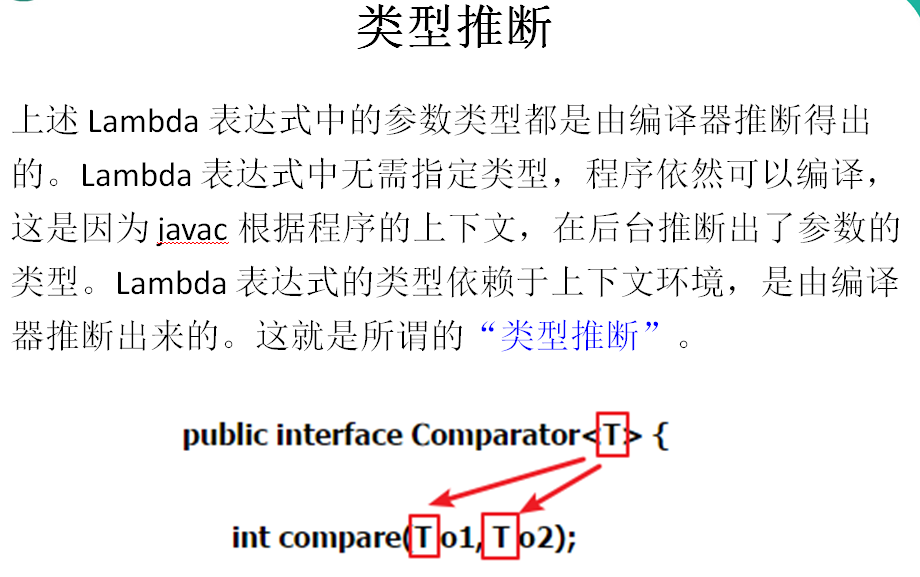
package day26_1; import org.junit.Test; //Write an interface B, which has an abstract method string upper (string string string); //Anonymous inner class is used to implement this interface, in which the string in the parameter is capitalized and returned //This interface is implemented by lambda expression, in which the string in the parameter is capitalized and returned interface B { String upper(String string); } // Most conventional approach class B2 implements B { @Override public String upper(String string) { return string.toUpperCase(); } } /* interface C { Integer max(Integer n1, Integer n2); // Maximum value } */ interface C<X extends Comparable> { // X is a generic here, indicating a type X max(X n1, X n2); // Take the maximum of two objects } /* * Write an interface C to define the abstract method Integer max(Integer n1, Integer n2); *In the test method, anonymous inner class objects are used to complete the implementation of this interface, and methods are called to print out *Use lambda expressions to do the same * */ public class LambdaExer { @Test public void test2() { C<Integer> c = new C<Integer>() { @Override public Integer max(Integer n1, Integer n2) { return n1 > n2 ? n1 : n2; } }; Integer max = c.max(10, 50); System.out.println(max); // lambda expression: focus on parameter list - > method body //C c2 = (Integer n1, Integer n2) -> {return n1 > n2 ? n1 : n2;}; C<String> c2 = (n1, n2) -> n1.compareTo(n2) > 0 ? n1 : n2; // Most versatile String max2 = c2.max("asfj", "ASFJ"); System.out.println(max2); } @Test public void test1() { B b1 = new B2(); String string1 = b1.upper("abcdefg"); System.out.println(string1); // Anonymous Inner Class B b2 = new B() {// Class body @Override public String upper(String string) { return string.toUpperCase(); } }; String string2 = b2.upper("abcdefg"); System.out.println(string2); // lambda expression, only focusing on abstract method parameter list - > method body B b3 = string -> string.toUpperCase(); String string3 = b3.upper("abcdefg"); System.out.println(string3); } } package day26_1; import java.util.Collections; import java.util.Comparator; import java.util.List; import org.junit.Test; /** * lambda Expression: interface is required. There must be only one abstract method in the interface and only one line of statement in the method body of method implementation * Syntax: parameter list - > method body * lambda Expression is essentially an object of an anonymous inner class, and the type can only be interface type * * Mainly used to replace anonymous inner class objects */ @FunctionalInterface interface A { public String test(Integer num); //public Integer test2(String num); } public class LambdaTest { @Test public void test3() { A a1 = new A() { @Override public String test(Integer num) { return String.valueOf(num); } }; // Parameter types can be omitted, and () is also omitted if there is only one parameter in the parameter list A a2 = num -> String.valueOf(num); String string = a2.test(200); System.out.println(string); } @Test public void test2() { List<Student> list = StudentData.getList(); // Comparator is used to compare two student objects Comparator<Student> comparator = new Comparator<Student>() { // The class body is equivalent to the implementation subclass of the interface @Override public int compare(Student s1, Student s2) { return (int)(s1.getScore() - s2.getScore()); } }; Collections.sort(list,comparator); for (Student student : list) { System.out.println(student); } System.out.println("&&&&&&&&&&&&&&&&&&&&&&&&&&&&&&&&&&&&&"); // lambda expression to do this requires the score to be in descending order // If there is only one line in our method body, you can omit {} or return //Comparator<Student> comparator2 = (Student s1, Student s2) -> {return (int)(s2.getScore() - s1.getScore());}; // Because generics already exist in the type on the left, the type in all expressions on the right can be inferred, so it can be omitted //Comparator<Student> comparator2 = (Student s1, Student s2) -> (int)(s2.getScore() - s1.getScore()); Comparator<Student> comparator2 = (s1, s2) -> (int)(s2.getScore() - s1.getScore()); Collections.sort(list, comparator2); for (Student student : list) { System.out.println(student); } } @Test public void test1() { Runnable r1 = new Runnable() { @Override public void run() { System.out.println(Thread.currentThread().getName() + " : hello"); } }; new Thread(r1).start(); // lambda expression: omit parent class or interface, method modifier and return value, method name, only parameter list, and method body // lambda expression is essentially an object of an anonymous inner class Runnable r2 = () -> System.out.println(Thread.currentThread().getName() + " : Hello2 "); new Thread(r2).start(); } }